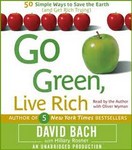要学会理财,当然不是一朝一夕的事。好习惯需要从小培养。早早地明白一些“钱”规则,不是要成为金钱的奴隶,而是要善于利用财富为自己为别人创造美好的人生。
英式发音 适合泛听
 Hostess: Teaching kids the value of a dollar seems to be 1)passé to many families. Maybe it never even happened, in fact. It's probably true that it's never been more necessary than now. We want our children to have the best we can afford, but are we spoiling them in the process? Here to guide us through this thorny issue is bestselling author David Bach, whose new book is called Go Green, Live Rich. And everything is, I guess, these days, go green, live rich, and also teach your kids about the environment, teach your kids about money.
Hostess: Teaching kids the value of a dollar seems to be 1)passé to many families. Maybe it never even happened, in fact. It's probably true that it's never been more necessary than now. We want our children to have the best we can afford, but are we spoiling them in the process? Here to guide us through this thorny issue is bestselling author David Bach, whose new book is called Go Green, Live Rich. And everything is, I guess, these days, go green, live rich, and also teach your kids about the environment, teach your kids about money.
女主持:对很多家庭来说,教育孩子们一块钱的价值看起来是很老土的事。事实上,也许没有人真的这样做过,但在当今社会,让孩子学会这一点,可能比从前任何时候都来得必要。我们想尽力把最好的给孩子,但与此同时,我们是不是把他们惯坏了?现在,在这个棘手问题上要给我们指引启发的是畅销书作家大卫·巴赫,他的新作名字叫做《过得“绿”,活得富》。如今,我觉得什么事情都离不开环保和致富这两个主题,所以我们也要让孩子们懂得环保,懂得理财。
David: Absolutely. I mean, where do kids learn things? You know, we send them to school, but the things that are really important, like money, it's usually not taught in school. In fact, it's almost never taught in school. So if you look at my life, my life was really shaped by my grandmother.
大卫:确实是这样。我是说,孩子们是从哪学到知识的呢?你知道,我们送他们去上学,但真正重要的东西,譬如理财,却往往是在学校里学不到的。事实上,学校几乎从来不教这个。所以如果你看看我的人生,我的人生实际上是我的祖母一手塑造的。
And my grandmother taught me about money starting at the age of seven. And my first lesson happened in McDonald's. So at McDonald's, she said, “I want you to walk up to the manager, and I want you to ask the manager if, if this company's 2)publicly traded.” I said, “C'mon, what are you talking about?” And I literally walked up to the manager, and the manager came back to the table with me, and said to my grandmother, “Yes, the company's publicly traded.” And she said, “I know that, but I wanted him to learn how to ask.”
我的祖母在我七岁的时候,就给我上了第一节理财课。我的第一节课是在麦当劳上的。在麦当劳,她说:“我要你去找那位经理,我要你问他,这家公司是不是上市的。”我说:“拜托,你在说什么?”但我真的就走到那位经理跟前,然后那位经理和我回到我们的桌前,对我祖母说:“对,这是家上市公司。”我的祖母说:“我知道,我只是想要让他学会怎么开口问人。”
Now I get chills thinking about that, because that was my first experience at being somewhere, my favorite restaurant in the whole world, and learning to think about what that meant, that you could invest in that company.
现在回想起那天的经历,我还是会觉得紧张,因为那是我第一次在某个地方——这个世界上我最喜欢的餐馆,学习思考投资一家公司到底意味着什么。
Hostess: These days, and I think it's been going on for years; people don't address the issue of money in front of children. They don't know what anything costs, they don't know—all they know is that I want more, I want more. So the bottom line is start with something as simple as that. But you have to know what it is, too.
女主持:现在——我想应该说是长久以来,人们在孩子面前都不会提起金钱这个问题。所以孩子们都不知道任何东西的价钱,他们不知道——他们只知道“我还要,我还要”。所以(教育孩子的)底线是,从一些最简单的事情开始。但你自己也要先弄清楚,到底是哪些事情。
David: It can start with as simple as taking your change out of your pocket when you come home, and I give it to my son, Jack who's four and three quarters. I give him my change, and he puts it in his piggy bank. Now what we're starting to talk about is how, when we fill up that piggy bank, we're going to give some money to 3)charity, and he'll help make somebody's life better with that money. We'll go buy a present or a gift for somebody to help somebody else. And then we'll take that money down to the bank, and we'll open him up a savings account. So I'm starting to teach him about the value of money, but also that money's for you, but money's for helping other people.
大卫:很简单,你可以这样起步:回家后,把你的零钱从口袋里掏出来。我会把零钱给我儿子——杰克。他四岁九个月大。我把钱给他,他把钱放进他的小猪储钱罐。现在我们要讨论的是,当储钱罐填满的时候,我们要怎么做。我们会把部分钱捐给慈善机构,那样,他会用这些钱帮助一些人过上更好的生活;我们会买礼物送给别人以帮助他人。然后,我们会把钱存进银行,帮他开一个储蓄账户。我就是这样教他钱的价值的,同时也让他知道钱是给他的,但是是用来帮助其他人的。
Hostess: What about stocks for children? I mean, how do you teach them at a young age, in their early teens or even pre-teen?
女主持:那怎么让孩子认识股票呢?我是说,在他们还小的时候——十几岁甚至十岁前,你会怎么教他们呢?
David: So simple. You, just like my grandmother got me into buying McDonald's stock, 'cause that was my favorite restaurant in the whole world at the time, you buy a stock for your kids in a company that they're already into. So if your kids are playing video games, Electronic Arts makes the video games. That's a great example. Maybe they're into some kind of cool shoe. What are the, maybe it's Nike. You buy them Nike. Or maybe they're into Disney. You know, one of the first stocks I ever owned was Disney. It should be something that the kids are excited about. Not that you're excited about, but that the kids are excited about.
大卫:那很简单。就像我祖母当年教我买麦当劳股票那样,因为那是我当时最喜欢的餐厅,你给自己的孩子买一家他们真的喜欢的公司的股票。所以,如果说你的孩子爱玩游戏机的,而美国艺电公司是这些游戏的开发商。那是个很好的例子。也许他们很喜欢某种酷酷的鞋子。随便什么牌子,也许是耐克,那你就给他们买耐克股票。或者他们喜欢迪斯尼。知道吗,我早期买的股票其中一种就是迪斯尼。那应该是孩子很喜欢的东西。不是你所喜欢的,而是他们所喜欢的。
Hostess:How much information do you give a child about the expenses in the home?
女主持:你让你的孩子对家里的开销了解多少?
David: I think it comes down to the, the 4)appropriate age. I know that growing up, my parents always talked to me about money. And my parents always shared with us what was going on. And I think that that's really important. I think too many parents try to shield their kids from what's going on financially.
大卫:我觉得那要等到合适的年龄。我知道在我成长的过程中,我的父母常常跟我谈钱的问题。发生了什么事,我的父母总会告诉我们,我觉得那真的很重要。我觉得有太多的家长想方设法地向子女隐瞒家里的财务状况了。


